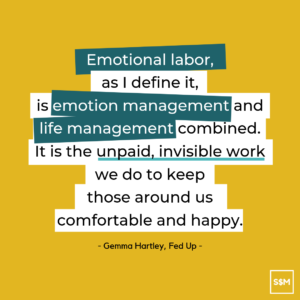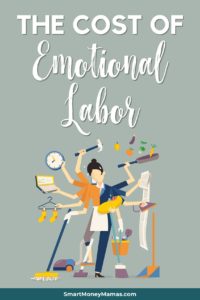A friend recently published his first book. And I couldn’t be more pleased for him. He landed a three-book contract, which means his long years of typing away on evenings and weekends has finally borne fruit.
But it was my friend’s wife, not my friend, that reached out to me with questions about handling various aspects of the book launch. She was also the one who cleared the family schedule to give the aspiring author time to write. The one who set up a reading at our local library. She created a Facebook group for the book. And it was she who asked friends to post reviews on Amazon and Goodreads.
All of these were loving and generous things for her to do. I couldn’t be more delighted about the culmination of my friend’s dream, and it’s lovely to see his wife’s pride and support for him.
So why was I mildly unsettled by how much she was doing?
Perhaps because I suspect most husbands wouldn’t provide the same kind of support for their wives. I suspect that such specific and ongoing effort simply wouldn’t occur to them.
That’s because there’s a gender gap in emotional labor. Women are expected to take responsibility for the well-being of those around them. But men aren’t expected to do the same.
What Is Emotional Labor?
The term emotional labor was first coined in 1983 by sociologist Arlie Hochschild. Unlike the modern meaning of the term, Hochschild used emotional labor to describe the ways low-wage and female workers are expected to regulate their own emotions and try to shape the emotions of others in order to complete the job. Hochschild used the example of flight attendants since they must maintain an upbeat demeanor while trying to calm nervous passengers and defuse potentially tense situations.

Since the term was coined, its meaning has shifted to incorporate the kind of emotional work typically handled by women in relationships. For instance, it is typically women who are expected to remember birthdays, send holiday cards, broker peace between fighting family members, support the ambitions of a loved one, listen to a friend’s troubles, dry children’s tears, and manage social occasions
Women are also expected to manage others’ emotions in the workplace. From being expected to simply shrug off a co-worker or manager’s bad behavior when they are in a bad mood, to feeling pressure to plan office parties despite it not being in the job description, women are asked to do invisible emotional labor on the job.
What is pernicious about this kind of labor is that women are penalized when they do not perform it, whereas men are lauded for doing any of it, no matter how little. Mothers see this in action anytime a father is heralded for comforting his crying child. Such a father is seen as a great example of parenting. But a mother comforting her crying child will often field dirty looks because it appears to outsiders that she’s not regulating the child’s emotion quickly or efficiently enough.
Ultimately, emotional labor is the expectation that women will support the emotions of anyone around them, without concern for their own emotional well-being.
The Costs of Emotional Labor
Managing your family’s and your co-workers’ emotions takes a toll.
For instance, after helping my 8-year-old manage his anxiety about a classmate’s mean behavior, helping my 5-year old calm down from a tantrum, and listening to my husband’s concerns about his performance in graduate school, I am also the one who notices that the dog is feeling cooped up and really needs a run outside. There is little emotional bandwidth left for dealing with my own concerns, anxieties, and feelings of cabin fever.
But an individual woman’s emotional well-being is not the only cost to emotional labor. There is also a very clear time and financial cost of constantly being the emotional laborer.
I am currently in the midst of a legal proceeding regarding my father’s estate. My lawyer is a woman in her late 30s. The opposing counsel is a man in his 60s. Recently, he was offended because of a small miscommunication from my lawyer. So offended that he was angrily slapping tables and shouting during a deposition.
Though my lawyer had done nothing wrong, she and I had to spend 30 minutes on the phone (of billable hours) crafting our strategy for handling this other attorney’s emotions regarding the miscommunication. My lawyer was able to get him calmed down, but it cost both time and money.
Women report similar situations at work wherein they have to waste time on managing the emotions of others.
Not only does this kind of emotional management take women away from their duties, but it is invisible labor. Women perform these tasks, which takes time and energy, and they end up appearing less like a “go-getter” than the male colleague who works under no such expectations.
Sharing the Emotional Labor
Unfortunately, there is no easy answer for emotional laborers who would like to ease their burden.
Simply refusing to do emotional labor will cause pushback, like when my stepmother harangued me for not writing a thank you note for a gift she’d given me, but gave my husband a pass when he did the same thing.
In addition, refusing to do emotional labor can mean that labor simply goes undone. (Which is unacceptable when the labor is for children or other vulnerable individuals.) A mother who is tired and overwhelmed may not want to comfort her child after a 3:00 a.m. nightmare. But she may also know that her husband will sleep through the crying. And since no one else will pick up the emotional slack, she feels that she has no choice but to do this labor. No matter how exhausted she feels.
Expecting others to perform their own emotional labor can also backfire. For example, had my lawyer and I just left the opposing counsel to stew in his misunderstanding, it would have set back our case.

And asking men to take on some emotional labor is its own emotional labor. That’s because we have to navigate their feelings while educating them on what this labor is and how to see it when our society has trained us not to see it.
Considering all this, it’s understandable why many women decide that it’s easier to carry on than change the status quo.
Making the Invisible Visible
That said, there are a few (relatively) easy things to do to start the process of making emotional labor more visible, and therefore more valued:
- Call it work. Emotional labor is invisible partially because we don’t consider it to be real work. If it’s not leisure, call it work. When it comes to the emotional labor in the workplace, try to include those duties in your job description. Make an effort to recognize the emotional labor done by others on your team. And if you’re in management, include the extra effort put forth by emotional laborers in your assessment of their job performance.
- Publicize your emotional labor. Putting up a list of everything you take care of around the house or office can help others to see what you do.
- Don’t solve problems that aren’t yours. It’s easy to fall into the trap of solving other people’s problems for them. If your husband texts to ask you to make an appointment at the dentist for him, respond with the phone number of the dentist’s office.
- Embrace momentary discomfort. We often take on emotional labor because we are trying to ease our own discomfort. For instance, it is uncomfortable when your co-worker tells you that Bob in accounting won’t have a retirement party if you don’t plan it. But simply allowing yourself to feel the momentary discomfort of saying “No” will help make it clear that your emotional labor is not free.
While none of these actions will solve the problem of unequal emotional labor, they can help you to draw and enforce emotional boundaries in your life. That’s an excellent first step in shifting the expectations for emotional labor.
Creating Shared Expectations for Emotional Labor
Getting to a future wherein emotional labor is shared equally isn’t going to be easy. Those of us who are already expected to manage others’ emotions have to continue doing that work. But we also need to teach men and other emotionally privileged individuals how to value this labor and take responsibility for their own feelings.
It might mean more emotional labor before we can embrace less.
Yet, imagine a world where women aren’t routinely told to smile. Where marginalized folks aren’t pressed to educated privileged folks. Where team-building is handled by everyone in a team. And where all spouses of newly published authors are excited to assume some emotional responsibility for a successful book launch. Isn’t the extra effort to change things worth creating that world?
Do you carry most of the emotional labor at your home or in your job? Share your experiences in the comments!




Emotional labor is real. This gives a name to that “drained” feeling at times when you did not physically do some task, but mentally trying to plan a meal, for instance, that everyone likes. This simple task can take a huge amount of thought and time. Think about it (especially all of you who do the cooking). My husband would tell me all about his day after work. He put himself right back in the bad mood, talked for quite a while. He did this every week day and sometimes weekends for 20 years. I wondered for a long time why helping him “relax” was so stressful for me. Why would I pull into the driveway and park for as long as I could dreading coming inside. I’d eventually come in to save the kids from his bad mood.
Yes! Even the “good ones” cause so much work for us, and are oblivious and/or don’t care. My husband died when I was 26. I felt guilty because my life was suddenly so much easier- and I was suddenly a single mom to a 2-year-old! I am 32 now, and I have absolutely no desire to marry again. I loved my husband, but it is so not worth doing it again for me.